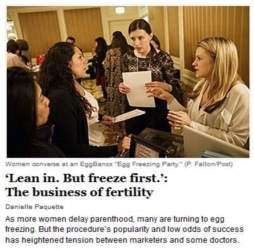
The recent Washington Post article “How Fear Fuels the Business of Egg Freezing” effectively addresses some concerns related to the increasing popularity of egg freezing. While this article has many salient points, many would agree that sometimes fear can arise when a knowledge gap exists. Therefore, when it comes to egg freezing and thinking proactively about your reproductive future, we thought best to provide answers to common egg freezing questions in the most transparent and forthcoming way possible. What’s important to note, some of the concerns surfaced in the story can be assuaged when a woman chooses a fertility center that has demonstrated expertise and success in egg freezing. A center that has resources dedicated to meeting or exceeding quality standards can allay many women’s fears.
-
How does a center define egg freezing success?
Egg freezing success is defined in two ways: whether there were enough eggs frozen for future use, and if a baby is taken home as a result of those frozen eggs. Two main factors that impact success rates:
The age at which a woman freezes:
As women, we rarely look deeply into our menstrual cycle to understand the mechanics of reproduction. We assume pregnancy will be easy to achieve, but the reality is that our eggs have a period of peak fertility potential in our late teens to late 20s, before beginning a slow decline in our early- to mid-30s. The decline becomes more pronounced after 35, making our fertility potential almost non-existent by the time we reach 40. True, some women achieve pregnancy using their own eggs after the age of 40, but it is more the exception than the rule. Shifting reproductive hormone levels result in slow chromosomal deterioration, which impacts the eggs’ ability to fertilize and result in a pregnancy and healthy baby.
Where a woman chooses to freeze her eggs:
A fertility center’s experience is vital to the success of egg freezing. Egg freezing using vitrification technology is very important, as is precision when thawing the eggs before insemination. At Shady Grove Fertility, we have performed over 1,000 egg thaws. As the largest fertility center in the country, our patients benefit from the extensive experience of our embryology lab and physicians. -
How will I know if a center is being transparent with success rates?
At Shady Grove Fertility, we take ethics and transparency very seriously and do not obscure reality from our potential patients. We are accountable to the truth and share success rate data on our website. While success rate data is limited, it’s not because of the science; it’s more because of timing. Since egg freezing with vitrification only came to the fore in 2012, some women are simply not ready to start a family by using their frozen eggs. That being said, our center has already celebrated 200 babies born, and counting, from frozen eggs.
-
Can anyone freeze their eggs if they want to?
For some women, egg freezing might not be beneficial. From a purely clinical perspective, we recommend elective egg freezing for women ages 30 to 40; ideally in their mid-30s. If a woman freezes too young, she is less likely to use those eggs in the future. But you also don’t want to wait too long either due to the declining quality of the eggs. At Shady Grove Fertility, one of the ways we can tell if a woman is a candidate for freezing is the Ovarian Assessment Report (OAR Panel) provided by Reprosource: According to Dr. Eric Widra, “Any premenopausal woman above the age of 25 can now benefit from the important clinical information obtained from appropriately performed egg supply testing. This testing can give a woman insight into her fertility window, menopause onset, and a number of other common health conditions. It is important, however, to obtain egg supply testing from a source that is able to provide clinically accurate information and to review the results with a fertility specialist.”
-
Why are the costs so high if there are no guarantees that it will work?
Currently, Shady Grove Fertility is one of only a few centers in the country that offer an egg freezing financial package. In addition to this, we work closely with a specialized financing company to help our patients afford treatment through financing. We continually seek ways to make access to care more convenient and affordable; this includes designing ways that make it more affordable for women who return to use their eggs.
-
What is the egg freezing process like at Shady Grove Fertility?
Upon making an appointment at SGF, each patient first completes ovarian reserve testing. When paired with age and medical history, results provide valuable insight into current fertility potential and if egg freezing is a good option. This is discussed during her new patient consultation. If egg freezing is deemed a good option by the physician and patient, the physician will discuss how many eggs she should freeze to ensure she has the optimal chance at having a baby in the future using her frozen eggs. Immediately following her physician consultation, the patient meets with a Shady Grove Fertility Financial Counselor to discuss financial options available. It is after this appointment that the patient can decide whether to take action or not.
At Shady Grove Fertility, it is our goal to make sure women are aware that this option exists. Through science-based, data-driven, facts,our data, experience and collective knowledge has given us the confidence to create the Egg Freezing Program.
To learn more about egg freezing, register for one of our upcoming patient education events, call 1-877-411-9292, or fill out this form to schedule an appointment.





